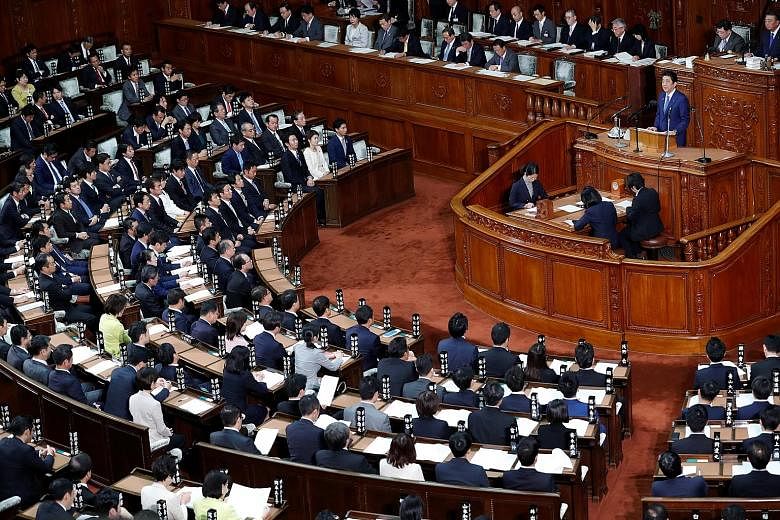Japanese Prime Minister Shinzo Abe, in his first policy speech to Parliament yesterday since he was returned to power, said he intends to move forward on revising the nation's 70-year-old Constitution.
While Mr Abe has previously stressed that he will not ditch Japan's pacifist stance, critics fear that his intended change to the war-renouncing Article 9 will be the start of a slippery slope towards a remilitarised country.
"I'm convinced our discussions on constitutional revision can go forward in our collective wisdom as we strive to find answers to the difficult issues confronting Japan," he said at the tail end of his 20-minute speech in a direct address to opposition lawmakers - who broke their stony silence with a round of heckling.
"This is only possible as we implement and execute policies. Let's face the difficult challenges that Japan is facing in a straightforward way together, and work towards opening up the country's future," he said.
Mr Abe's ruling Liberal Democratic Party (LDP) and its coalition partner Komeito control a two-thirds "super majority" in Parliament's Lower and Upper chambers - the level of support required to move any revision to the Constitution towards a public referendum. The proposed changes will require a majority vote by Japanese citizens.
He also said, without giving a concrete timeline, that Japan would try to see the Comprehensive Progressive Agreement for the Trans-Pacific Partnership (CPTPP) brought into effect early. This was agreed in principle last week by 11 countries of the Trans-Pacific Partnership (TPP) excluding the United States, whose President Donald Trump withdrew from the TPP in one of his first acts in office.
Yesterday marked Mr Abe's first policy speech to Parliament since his party was overwhelmingly returned to power at a snap election last month.
The Prime Minister, who has been in power since December 2012, was re-elected to the hot seat by lawmakers in a session on Nov 1.
In his address, Mr Abe vowed breakthroughs in the North Korea impasse and in tackling his nation's declining birth rate.
He also discussed moving Japan, whose growth has been stymied by corporate inefficiency and a chronic lack of women representation in the workplace, towards a "productivity and human resource development revolution".
On North Korea, which intelligence officials say has been making technological progress, Mr Abe said: "It is not an exaggeration to say that the security environment surrounding Japan is the most severe after World War II."
He reiterated that Japan will gear up preparations for "every possible situation" if provocations escalate, under the framework of a "strong Japan-US alliance".
His remarks came days after high-level summit meetings in Vietnam and the Philippines where, together with Mr Trump, he impressed upon global leaders the need for coordinated action against North Korea. The last provocative act by North Korea was on Sept 15, when it fired a second missile over Hokkaido, although the war of words since then has not let up.
Mr Abe also said that early childhood education will be made free of charge for those aged between three and five years old by 2020, so as to spark a "human resource development revolution".
He also discussed huge investments in the fields of robotics, the Internet of Things, and innovation in the three years until 2020, so as to drive a "productivity revolution".
Mr Abe added: "Japanese citizens have indicated their desire for stable politics. We will work on these policy pledges one by one and deliver results. Let us all have constructive debates, while advancing policies for the people together."

